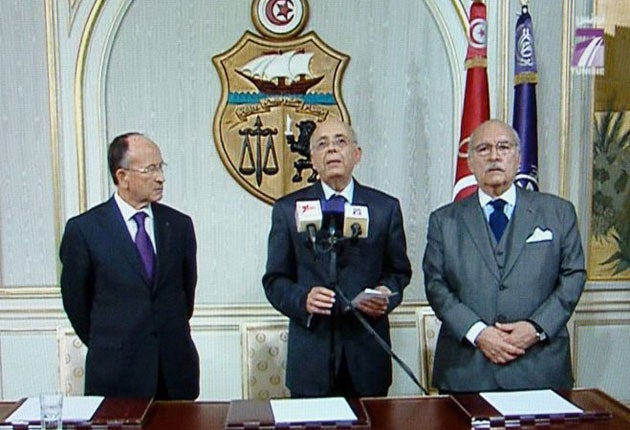Tunisian PM calls for calm and pledges coalition and election

Your support helps us to tell the story
From reproductive rights to climate change to Big Tech, The Independent is on the ground when the story is developing. Whether it's investigating the financials of Elon Musk's pro-Trump PAC or producing our latest documentary, 'The A Word', which shines a light on the American women fighting for reproductive rights, we know how important it is to parse out the facts from the messaging.
At such a critical moment in US history, we need reporters on the ground. Your donation allows us to keep sending journalists to speak to both sides of the story.
The Independent is trusted by Americans across the entire political spectrum. And unlike many other quality news outlets, we choose not to lock Americans out of our reporting and analysis with paywalls. We believe quality journalism should be available to everyone, paid for by those who can afford it.
Your support makes all the difference.Hundreds of soldiers manned the streets of the Tunisian capital today where the prime minister was meeting opposition parties to try to form a coalition after protests swept the president from power.
In a dramatic climax to weeks of violent protests against his rule, Zine al-Abidine Ben Ali, Tunisia's president for more than 23 years, fled to Saudi Arabia on yesterday and Prime Minister Mohamed Ghannouchi took over as caretaker president.
But it was not clear whether protesters, angered by poverty, unemployment and repression, would accept the technocrat Ghannouchi, prime minister since 1999, due to his close association with Ben Ali's rule.
The Tunisian army was called onto the streets, as residents said groups were marauding through Tunis setting fire to buildings and attacking people and property.
Army roadblocks were today blocking access to Bourguiba Avenue, Tunis' main thoroughfare and scene of clashes yesterday. Several hundred soldiers as well as tanks, military jeeps and armoured personnel carriers manned the approaching roads, still littered with the debris from the violence.
A military helicopter circled over the city centre.
In working class suburbs, residents lined the streets with metal bars and knives to ward off looters.
Ghannouchi went on live television, via telephone, last night to promise everything was being done to restore order.
He said he would meet representatives of political parties today to attempt to form a coalition government.
Ghannouchi told a private Tunisian television station in a telephone interview that today would be "a decisive day".
"I will meet representatives of political parties to form a government which I hope will meet expectations."
One of those invited to meet Ghannouchi for coalition talks was Najib Chebbi, an eloquent lawyer who has long been seen by Western diplomats as the most credible figure in the opposition.
"This is a crucial moment. There is a change of regime under way. Now it's the succession," Chebbi told France's I-Tele TV. "It must lead to profound reforms, to reform the law and let the people choose."
Mustafa Ben Jaafar, head of the Union of Freedom and Labour party, told Reuters he and two other opposition figures would meet Ghannouchi at 10:00 a.m. (0900 GMT).
"...The most important thing is to get this country out of the impasse that it is in," he said.
He said the other opposition figures invited to attend the meeting were Chebbi, and Ahmed Ibrahim, head of Ettajdid party.
"I salute the fact that groups of young people have got together to defend their neighbourhoods but we can assure them we will reinforce their security," Ghannouchi said.
"We are at the service of the Tunisian people. Our country does not deserve everything that is happening. We must regain the trust of citizens in the government."
He told Tunisians he would steer the state until early elections, but protesters warned they might take to the streets again.
"Tomorrow we will be back on the streets, in Martyrs Square, to continue this civil disobedience until ... the regime is gone. The street has spoken," said Fadhel Bel Taher, whose brother was one of dozens of people killed in protests. "All I fear is that the Tunisian street, as long as it sees one person from this regime remain, will continue to complain. We need to create a government in which all parties are represented, to salvage the situation," said Paris-based analyst Ahmed al-Bawlaqi.
The Eurasia Group consultancy said: "Although the streets of Tunis are calmer than they have been in several days, Ben Ali's departure is not likely to immediately defuse tension across the country".
"If Ghannouchi does not announce a definitive timetable for new presidential elections, or if he does not form a transitional government with substantial opposition representatives in the short term, it could drive protesters back out in the street," it said in a research note.
The violence and rapid turn of events sent shockwaves across the Arab world, where authoritarian rulers are deeply entrenched, but face mounting pressures from growing young populations, economic hardship and the appeal of militant Islam.
Western powers have long turned a blind eye to rulers in the region who provide a bulwark against Islamist radicals. The United States led international calls for calm and for the people of Tunisia to be given a free choice of leaders.
Join our commenting forum
Join thought-provoking conversations, follow other Independent readers and see their replies
Comments